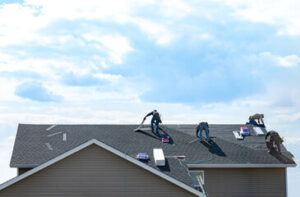Home » Posts tagged 'roof repair'
Tag Archives: roof repair
What to Expect From a Roofing Installation
Roofing work can make a mess of your yard and garden, so the contractor should cover sensitive areas with tarps. They should also have a dumpster delivered and use boards to protect things like air conditioning units from debris.

Roofers should wear comfortable shoes with rubber soles to prevent slipping on exposed nails or shingles. They should also have a harness and line ready for emergencies.
Many different types of materials can be used to cover a roof. The best choice depends on a number of factors, such as cost, durability and aesthetics. Each type has its advantages and disadvantages, and homeowners should consult a roofing professional to decide which is right for their home.
Asphalt shingles are one of the most common types of roofing material. They are available in a wide range of colors and styles, and they are affordable and easy to install. They also provide good protection from rain and sun exposure.
Metal roofs offer superior strength and durability. They are also resistant to fire and ice damage, and they can be installed on most types of homes. Some metal roofs are coated to improve their insulation and weather resistance.
Concrete and clay tiles are beautiful options for a roof, and they are often seen on Mediterranean, Mission or Southwestern-style homes. They are durable and energy efficient, but they can be expensive and heavy.
Rolled roofing is a good option for budget-conscious homeowners. This type of roofing is made from a composite material and comes in a roll, making it easier to transport than shingles. It is best for low-inclined roofs and can be hammered down quickly. It is not recommended for flat roofs, however, as it may leak.
Other roofing materials include mineral granules, gravel or slate. These options are more decorative than traditional shingles and can add value to your home. They also help to reduce cooling costs and are an environmentally responsible choice.
Lastly, solar shingles are the latest innovation in roofing. These shingles generate electricity and can help you cut your energy costs while contributing to a cleaner environment. They are not yet widely available, however, and will require specialized installation by a roofer who specializes in building-integrated photovoltaics (BIPV).
Regardless of the type of roofing materials you choose, there are some basic tools that all roofers need to have on hand. A ladder is required for reaching the roof, and it should be sturdy enough to support your weight. A broom and leaf blower are helpful in cleaning off the roof before you start to work. A caulk gun and roofing caulk are also essential for ensuring that the raw edges of the roof are watertight.
Safety
The safety measures taken during roofing installation can make or break a project’s success. It’s vital that contractors provide their crew with thorough training on the latest safety standards and procedures. Additionally, they must be provided with high-quality personal protective equipment (PPE), such as hard hats, safety goggles, gloves, and slip-resistant footwear. PPE should be inspected regularly to ensure that it’s in good working condition.
Keeping a clean, organized work site is also crucial for keeping roofers safe. Prior to beginning work, the area should be blocked off from any people, pets, or children. Ladders should be secured and angled properly for stability, and no one should ever step on the top rung of the ladder. Workers should be supplied with plenty of water to stay hydrated. Adequate hydration can help keep workers alert and prevent heat stroke and dehydration, both of which are common workplace injuries on construction sites.
If possible, it’s best to avoid working on a roof in bad weather. Snow and ice pose an additional danger, as they may cause roofers to lose their balance and fall. Additionally, wind can easily knock a worker off of a ladder or off the roof itself.
Construction workers should wear a harness whenever they’re on the roof. The harness should fit around the torso and waist, with straps that secure over the shoulders. For added safety, choose harnesses in bright colors so that they’re easy to see against a dark roof.
In addition to wearing a harness, roofers should always have three points of contact with the ladder or roof at all times. This can help reduce the risk of falls, which are the most common source of construction injury.
Lastly, contractors should only hire trained and experienced personnel for their roofing projects. This helps minimize the number of mistakes that could lead to serious injury or even death.
Even when proper precautions are taken, many roofers still face dangerous situations on the job. Some construction companies put profit over the safety of their employees, and these employers can be held liable for negligence. Construction site owners and general contractors are required to make construction sites as safe as possible for workers, according to New York labor law 241.
Roofing Contractors
A roofing contractor oversees the roof installation process for a building or home. They work with a team of other construction professionals to coordinate the timing of various tasks and to ensure that roofing work is integrated smoothly with other construction activities. Roofing contractors must also collaborate with homeowners, answering questions and concerns, addressing specific needs, and providing information about materials and techniques. Customer service skills are important for this profession, especially since roofing work is often done near other homes and businesses, causing disruption to those who live or work in the area.
Roofing contractors may specialize in the installation of specific types of roofing material, such as asphalt or fiberglass shingles. They must be knowledgeable about the different types of shingles and how each one works with other materials and with the weather. They should be able to recommend the right type of shingle for the climate in the region and explain the benefits of each option.
Many experienced roofing contractors have extensive professional credentials. They are certified by manufacturers to install their roofing products, indicating that they have undergone rigorous testing and demonstrated high levels of technical knowledge and professional expertise. In addition, a roofing contractor with an endorsement from a manufacturer can offer extended material warranties to customers.
The experience of a roofing contractor is a critical factor in determining the quality of work that will be performed on a project. Inexperienced contractors may cut corners to save time and money, which can lead to problems later on. An experienced contractor will know how to avoid these problems and will provide a higher quality of workmanship.
A good roofing contractor will be able to give an accurate estimate of the project costs and timeline. They should be honest and transparent about pricing, and they should never try to sneak in extra fees or charges. They should also be able to walk the homeowner through the finished roof, answering any questions and demonstrating the work they have performed.
Roofing contractors also need to have excellent safety protocols in place to protect themselves and the homeowners they work with. They should always follow all industry safety standards and regularly train their crews in these standards. This will reduce the risk of accidents and injuries during the course of a project.
Weather
The weather conditions present an array of challenges during roofing installations. Ideal roofing conditions include a clear day and moderate temperatures, but these factors aren’t always available. Winds can make working at heights dangerous, and rain can halt work and expose the home to water damage. Local roofers are skilled at managing these weather constraints and minimizing the impact on the schedule and quality of the final project.
In cold weather, the physical labor involved in roofing can cause workers to tire faster. This can lead to mistakes and accidents, and the ice and snow can make it harder for them to work safely. Fortunately, there are steps that can be taken to mitigate these issues, including providing a warm work surface and recommending and installing snow guards.
Roofing in the winter requires additional precautions to ensure worker safety. While a roof can be installed in the winter, it should only be done by experienced contractors who have the right equipment for the job. These tools must be inspected regularly to ensure they are in good condition and can handle the extreme cold. It’s also important to recommend and install a thermal barrier between the roofing materials and the attic. This can help reduce energy bills and prevent the occurrence of mold and mildew.
Extreme temperatures can also affect the performance of roofing materials, reducing their flexibility and making them more difficult to handle. These effects can be minimized by using a warmer adhesive or ensuring that the roofing material is stored in a heated area until it’s needed for installation.
Skilled Roofers: Top-Quality Service For Every Roofing Project
This roofing company is a one-stop shop capable of repairing, replacing, or installing asphalt shingle, flat, or rubber roofs. Its professionals are dedicated to superior workmanship and stay up-to-date with the latest technologies.
Roofing is a physically challenging job that requires endurance and good problem-solving skills. Roofers are also comfortable working in outdoor conditions.

Experience
As a highly specialized trade, roofers have honed their skills for years. They can offer homeowners peace of mind that they are getting a good return on their investment. They also have the experience to quickly identify problems and solve them, preventing minor issues from becoming costly ones. A reputable roofing contractor will also be available for future repair and maintenance work.
To become a skilled roofer, you must have experience working with various types of roofing materials and styles. This can include shingle, metal, flat, and other options. You must also be able to identify and repair leaks in existing roofs, as well as re-shingle or replace damaged sections of the roof. You will often use power tools like drills, hammers, and tape measures, as well as a variety of other hand tools. You will also need to follow all safety protocols when working on a roof, including ladder and scaffolding usage.
Because you will likely be working with large and heavy materials, you must also have physical endurance. This is a physically demanding job, especially during the hotter months when you will be spending much of your time outdoors. You will need to be able to climb, move around with equipment and materials, and lift heavy objects like bundles of shingles.
The roofing industry has been facing a shortage of qualified workers for some time, and that is expected to continue into the foreseeable future. Many of the skilled tradespeople who worked in construction during the housing boom left the industry and never returned. Others are being pushed out by rising wages in other industries.
Those who want to pursue a career as roofers should consider joining a union apprenticeship program. These programs provide structured learning opportunities for apprentices and can help them earn a certification that can boost their employment prospects. They can also offer a path to becoming a skilled roofer with a solid resume and strong work ethic.
If you have a passion for the outdoors, are a good problem-solver, and are willing to invest in training, then roofing might be the right career choice for you. However, you should carefully consider the pros and cons of this career before committing to it.
Certifications
Roofers repair, install, and replace roof systems on residential and commercial buildings. They also perform regular maintenance, repairing leaks and other problems. These professionals use different types of roofing materials, including rubber, metal, and hot tar. They may also be required to work with other tradespeople, architects, and engineers on a project.
Becoming a roofer requires a lot of hard and soft skills. The hard skills include physical fitness and comfort working at heights, as well as knowledge of various roofing materials like asphalt shingles and tile. The soft skills include attention to detail and good communication.
Most roofers receive on-the-job training, allowing them to learn the necessary skills through hands-on experience. They may also participate in apprenticeship programs to gain more advanced skills and expertise. They must be able to communicate effectively with other crew members, supervisors, and customers. In addition, they must be comfortable using tools like ladders, tape measures, and nail guns.
Roofing contractors must be certified to work with certain roofing materials, which requires additional training and testing. Certification can take months or even years, and the manufacturing company often oversees many roofing projects before giving its “stamp of approval.”
While there are no licensing requirements at the state level for roofers, some counties may have specific license requirements. Homeowners should research their local governments to find out what if any, requirements they might face.
In addition to obtaining industry-specific certifications, roofers should hold general liability insurance. This coverage protects the roofer in case an accident occurs during a job and damages property. It can also cover medical expenses for any injuries that a worker sustains while working on a roof.
Having general liability insurance can be a huge selling point for potential clients, as it shows that the roofer is committed to professionalism and quality workmanship. In addition, it can help reduce the risk of expensive legal action that could arise if a homeowner is injured during a roofing project.
Insurance
A roofing contractor must have the right insurance coverage to protect their business from potential liabilities. The most common types of insurance for roofing contractors include general liability and workers’ compensation. Some companies even combine both of these policies into a single policy called a business owner policy (BOP).
A well-established roofing company should have no problem providing you with proof of their insurance coverage, so don’t hesitate to ask for it. Ideally, you should also inquire about the company’s history of claims and accidents to get an idea of how long they’ve been in business without any incidents.
In addition to these two policies, roofers should have commercial property and business interruption insurance, as well. Commercial property insurance covers a building’s contents, including tools and materials, in the event of an insured peril such as fire. Business interruption insurance provides income replacement for the time a business is closed as a result of an insured loss.
Lastly, a quality roofing contractor will have commercial auto insurance for their work vehicles. This type of small business insurance typically covers damage and injuries to third parties caused by a company vehicle while it’s in use for work-related purposes. This is a must-have for any small roofing contractor who employs employees.
When selecting a roofing contractor, you should look for one who offers a comprehensive service from initial consultation to installation and cleanup. A reputable company will have no hidden fees and offer warranties that cover normal wear and tear. They’ll also use high-quality materials and precise techniques to ensure the longevity of your roof.
Homeowners understand that accidents can happen, which is why they prefer to work with roofers who have general liability insurance. If something goes wrong during a roofing project, homeowners can sue the contractor for medical bills, property damages, and other expenses. Since these fees can be quite expensive, roofing contractors need to have sufficient liability coverage.
Reputation
A roofing contractor with a solid reputation is a good choice for your home remodeling project. This is true for both new roof installations and replacements. Reputable roofers can provide references from satisfied customers and photos of completed projects. This is a great way to learn about the work that they do and how well they do it. You can also check online reviews to find out what other homeowners have to say about them. A quick search can eliminate contractors who have a lot of complaints, which can be a red flag for shady deals and poor workmanship.
A legitimate roofing company should be able to provide you with a written estimate that clearly states the costs of your project. It should also include a detailed breakdown of the work that will be performed and the materials that will be used, including any insurance-related expenses. This is an important step to avoid any surprises down the road, especially since the quality of your roof depends on the type of materials that are chosen.
Beware of shady contractors who offer to pay your insurance deductible as part of the contract, but then fail to perform the necessary repairs or replace your roof. This is a common practice in the industry and it can be very misleading to homeowners, as you are trusting your home to a stranger. It also puts you at risk of having your insurance claims denied or even a mechanics lien placed on your property if the roofer does not pay their subcontractors.
Choosing an expert local roofing company that has been in business for years is one of the best ways to ensure high-quality work. A roofing contractor with extensive experience in your community can intuitively understand local weather patterns and construction trends, which can help protect against costly mistakes during a roof repair or replacement.
